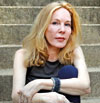Pulitzer winner who braved the slums of Mumbai
View(s):When Katherine Boo first began to walk through the Mumbai slum known as Annawadi, crowds of people would follow her, shouting “Hyatt! Intercontinental!” “They imagined I’d lost my way while going from the international airport to one of the luxury hotels,” the Pulitzer Prize winning author said in a Q&A. The Annawadians were also curious about Boo’s Indian husband, the historian Sunil Khilnani. “In the months before they got to know him, they were whispering about how he must not love me, since he was permitting me to hang out alone in a slum in the middle of the night.”

Katherine Boo
Undeterred by their initial resistance, Boo kept coming back for a period of some four years, doing what she did best, a process she describes as following as many people as she can, meticulously observing where they go and what they do. The more she knows about more of the people in her pool, the better her sense of which experiences are unique to certain individuals and which ones are shared.
“As a writer I’m not looking to tell the most flamboyant tales, nor to describe only the most virtuous and super-talented people. I’m looking for resonant stories—stories that might illuminate something about the structure of a society. And it’s difficult to predict in the beginning which individuals’ experiences, months or years later, will come to shed that light.”
Elaborating on this, she told The Hindu: “In other words, I’m not parachuting into a place and asking people to describe some dramatic event of the past. I’m watching people negotiate the dilemmas of their lives in real time.” Though she kept her personal story out of the main narrative, Boo has had her own share of challenges. Writing in an afterword, she explained that she had always been dogged by ill health and had suffered rheumatoid arthritis since her early teens as well as auto-immune disorders. Boo was initially worried that she would fare poorly in the humid and notoriously unhealthy atmosphere of the slums. But then one night, in her flat in Washington, DC, she tripped over a dictionary and lay there helplessly for hours with a punctured lung and three broken ribs. ‘Having proved myself ill-suited to safe cohabitation with an unabridged dictionary,’ she wrote, ‘I had little to lose by pursuing my interests in another quarter – a place beyond my so-called expertise.’
A journalist in The Telegraph noted that both Boo and her translators (she had three; the longest serving was Unnati Tripathi) were dogged by constant fevers and infection. But Boo’s fortitude had been strengthened by years of illness, even though by the time they finished, she says, she and Tripathi weighed less than 100 pounds.
Boo wrote about what she found in Annawadi in her debut, ‘Behind the Beautiful Forevers: Life, Death, and Hope in a Mumbai Undercity.’ She won a slew of awards for the 2012 book, including the National Book Award for Nonfiction (2012), the Los Angeles Times Book Prize (2012), The American Academy of Arts & Letters Award in Literature, New York Public Library Helen Bernstein Award for Excellence in Journalism (2013), the PEN/Kenneth Galbraith Award for Nonfiction (2013), the Book-of-the-Month Club New Visions Award and Oldie Travel Writer of the Year (UK).
However, despite her successful foray into non-fiction, Boo is primarily an acclaimed journalist. In 2000, her series for the Washington Post about group homes for intellectually disabled people won the Pulitzer Prize for Public Service (One of the fourteen American Pulitzer Prizes annually awarded for journalism). A former editor for The Washington Post, her reporting on disadvantaged communities has also been recognized with a MacArthur “Genius” Grant, and a National Magazine Award for Feature Writing.


